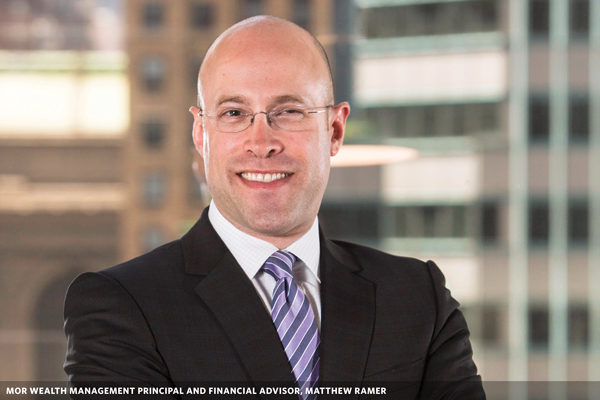Matthew Ramer is a high-energy guy who fits a lot of activities into a busy life and can cram a lot of topics into a nearly hour-long conversation. When it comes to his independent financial advisory firm, MOR Wealth Management in Philadelphia, the main talking point centers on his belief that its mission is twofold: helping clients live life on their terms without financial worry, and having an active commitment to community and environmental stewardship. And by doing the latter, Ramer hopes that he can—in whatever small way—help nudge the financial services industry toward playing a bigger role in benefiting the commonweal.
Ramer, 43, doesn’t shy away from expressing his belief that the financial services industry, including financial advisors, should devote more resources to improving their communities. “I feel that those of us who are lucky enough to work in a field where we’re paid handsomely should feel obligated to return some of that financial success back to that community,” he says. “While most financial firms do that to some capacity, I feel that all too often firms are doing that for show.”
MOR Wealth Management (“MOR” is Ramer’s initials) backs up its talk with both time and money. First, the money: The firm gives 10% of its profits to the community each year. “Sometimes I look at that number and say, ‘Oh my god!’ There’s always a small sense of greed that drives the human race,” he says. “But I don’t feel OK doing what I do for a living unless my objective is taking that success and putting it back into the community.”
That ties into MOR’s status as a certified B Corporation. B Corps are certified by B Lab, a nonprofit organization seeking to build a community of socially and environmentally conscious businesses. B Corps are required to consider the impact of their decisions on their employees, suppliers, community, consumers and the environment.
As part of that, MOR proclaims on its website the percent of profits it donated to charity in the prior year (11%); the percentage of investments screened for social responsibility (90%); that all eight members of its staff engage in volunteerism; and that it printed 139 pages of paper in the prior month.
That last point might seem a little odd, but it ties into Ramer’s belief in environmental stewardship. “Don’t quote me on this, but it’s my recollection that the average American office prints about 32 pieces of paper per employee per day,” he says. “We are less than two pieces of paper per employee per day. A few months ago, we hit our lowest level at 1.2 pieces per day.”
Ramer says he spoke about this topic as part of a think tank last year, and a couple of days later got a call from another firm that wanted to know how MOR drastically reduced its paper use. “I explained we went so paperless by using laptops/tablets, and as much as possible have clients use resources such as DocuSign for digital signatures,” he recalls. “I haven’t spoken with them in months. But I’m confident that whether they went to the extreme that we went to or they changed their practice, even just a little bit, then we moved the needle even just a little.”
The phrase “move the needle” came up often during a recent conversation with Ramer, and the word “extreme” as it applies to him was also discussed. “I’m very much high energy, which can be a good or a bad thing because sometimes I can scare people,” he says jokingly. “I get very excited about things I deeply believe in. I understand why people will sometimes describe me as being extreme.”
Ramer got his start in the industry with Morgan Stanley. He says he became disenchanted with the traditional Wall Street culture. “As I climbed that ladder, the amount by which profit took precedence over service really bothered me,” he says.
Advisor’s Advice To Advisors: We Can Make The World A Better Place
February 2019
« Previous Article
| Next Article »
Login in order to post a comment








